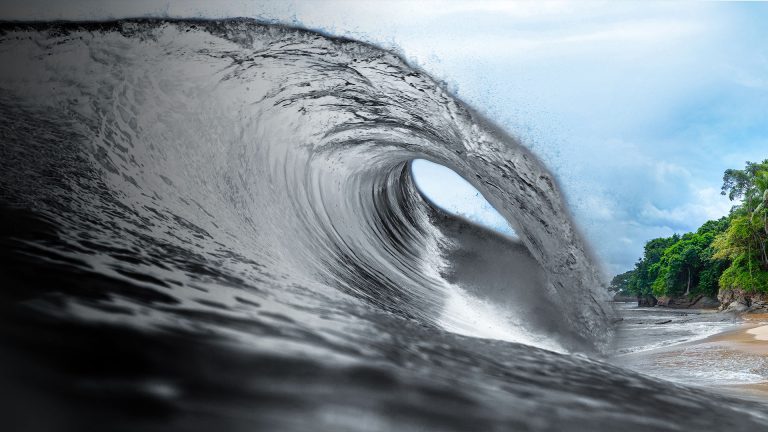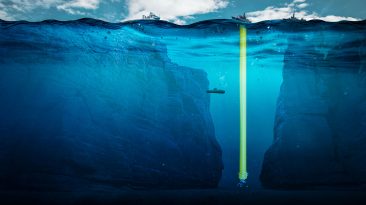What’s shiny, liquid, conducts electricity and is also the surname of a legendary rock star? You guessed it, mercury. This naturally occurring element has a lot of uses, but it’s also quite dangerous; even a tiny amount can be poisonous. So what if we had oceans of it?
Could Earth harbor oceans of liquid mercury? How would it affect the planet? Would we survive?
Before you go diving into a pool of mercury, we’d better learn about its properties. Mercury is the only metal that exists as a liquid at room temperature. Both water and mercury turn into gas or vapor at higher temperatures, yet as a basic element, mercury doesn’t break down like water. It merely changes state. This makes it toxic to ingest and especially volatile, as it often ends up accumulating in our soil, oceans, and in many sea creatures we like to eat.
A lot of this is a result of human-made mercury emissions, from the burning of fossil fuels, gold mining, or the mineral extraction of cinnabar (HgS). Mercury works especially well as an amalgam, or metal alloy, making it great for extracting gold from rocks, forming tooth fillings with silver, or extending battery life by bonding with zinc.
It also expands and contracts with changes in temperature, making mercury a key ingredient in thermometers. Although it’s incredibly useful, what would a whole ocean of mercury do to our planet?
Perhaps the most immediate change we’d notice is a whole lot of objects floating up to the surface. Which might be great for treasure hunters or cryptozoologists.
Literally anything sunken throughout history would come flying up to the surface, making the ocean a massive floating dump. This is because mercury is 13.5 times denser than water, making it incredibly buoyant. According to Archimedes Principle, the upward buoyant force exerted on a body immersed in a fluid is equal to the weight of the fluid that is displaced.
Like salt water, mercury has a higher density than freshwater, so most objects will float to the top but be unable to find equilibrium. Even a freaking anvil! So brace yourselves, fearless sea travellers!
Your boats are going to lose balance and tip right over. And if you happen to fall into the ocean, you’d make a little splash and bob around like a human buoy.
In fact, if you had a good set of flippers or incredible balance, you could try to walk across the ocean. But enough of the antics, we’ve got a much bigger problem on our hands.
With no water left in the ocean, we’d have to produce it artificially in a lab. We likely wouldn’t have enough energy to produce enough water for the entire global population. We might even wage war over the stuff in post-apocalyptic desert battles!
Okay, that’s if we manage to endure any of the planetary effects. Surprisingly, changing our oceans to mercury would only increase Earth’s mass by 0.26%. Thankfully, this wouldn’t be enough to cause any drastic changes to our orbit or gravity, but the added weight on the Earth’s mantle would put a lot more pressure on tectonic plates. This would trigger catastrophic earthquakes and volcanoes all over the world, killing billions, if not every living thing, on Earth. Sorry to burst your bubble.
Even if you managed to survive, the atmosphere could kill you. Clouds of mercury would form and the air we breathe would contain poisonous mercury vapor, causing severe neurological problems such as anxiety, memory problems and tremors.
We’d have to wear masks 24/7 and also a whole lot of sunscreen. With it’s shiny metal surface, mercury has a higher albedo, or reflectivity, than snow, meaning we’d have a lot more solar radiation to contend with. All this increased radiation could lead to a cooling effect, significantly lowering the overall global temperature of the Earth.
I guess the silvery lining here is we might actually solve global warming. Only briefly though. Humankind probably wouldn’t survive very long in the severe toxicity of a liquid mercury planet, but back in the real world, maybe we could at least learn practical ways of staying afloat and surviving on a sinking ship.
Subscribe to What-If on YouTube or follow the show on Facebook Watch.
Sources
- “Surface Tension”. 2020. engineeringtoolbox.com.
- “Ocean Facts”. 2020. see-the-sea.org.
- “Understanding Mercury Poisoning”. 2020. Healthline.
- “Making Water From Hydrogen And Oxygen”. 2020. Thoughtco.


















